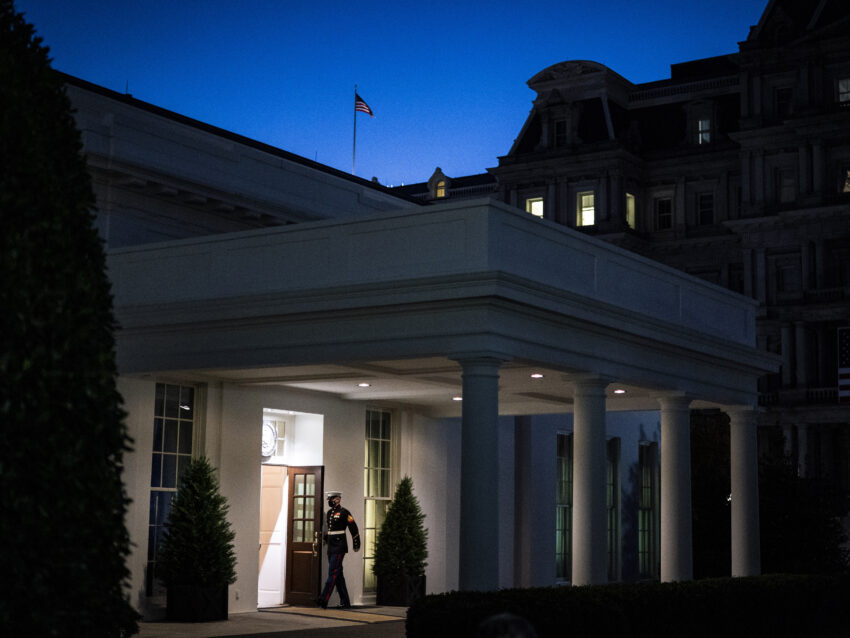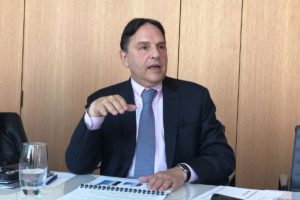https://www.boston.com/news/politics/2020/11/12/trump-insists-hell-win-but-aides-say-he-has-no-real-plan-to-overturn-results-and-talks-of-2024-run
President Donald Trump declared Wednesday on Twitter, “WE WILL WIN!”
But, in fact, the president has no clear endgame to actually win the election – and, in an indication he may be starting to come to terms with his loss, he is talking privately about running again in 2024.
Trump aides, advisers and allies said there is no grand strategy to reverse the election results, which show President-elect Joe Biden with a majority of electoral college votes, as well as a 5 million-vote lead in the national popular vote.
Asked about Trump’s ultimate plan, one senior administration official chuckled and said, “You’re giving everybody way too much credit right now.”
Republican officials have scrambled nationwide to produce evidence of widespread voter fraud that could bolster the Trump campaign’s legal challenges, but no such evidence has surfaced. And Biden’s lead in several states targeted by the Trump campaign has expanded as late-counted votes are reported. In all-important Pennsylvania, the Democrat now leads by more than 50,000 votes.
Still, the absence of evidence and of a comprehensive and realistic plan to overcome Trump’s significant deficit and secure him a second term have not stopped some of the leading figures in the administration and the Republican Party from amplifying the president’s misinformation about the election outcome.
Secretary of State Mike Pompeo’s recent pledge for “a smooth transition to a second Trump administration” and Vice President Mike Pence’s assertion that the election was not over have helped sow public doubt about the integrity of the vote and raised concerns from allies abroad about the state of America’s democracy.
Save for a visit Wednesday to Arlington National Cemetery in observance of Veterans Day, Trump has not appeared in public since last Thursday, when he delivered a statement challenging preliminary election results. He has instead addressed the election in social media posts or through his spokespeople, promising to keep fighting until he is declared the winner.
Trump has been spending his days largely on the phone, calling advisers, allies and friends. The president has been “trying to find people who will give him good news,” one adviser said.
Still, Trump has indicated in some of these conversations that he understands Biden will take over the presidency on Jan. 20, Inauguration Day. Rather than talking about a second term, Trump has been matter-of-factly discussing a possible 2024 campaign – an indication that he knows his time as president is coming to an end, at least for now.
“I’m just going to run in 2024. I’m just going to run again,” Trump has been saying, according to a senior administration official who has spoken with him this week.
That official, like others, spoke on the condition of anonymity to candidly recount sensitive internal conversations.
Doug Deason, a top Trump donor who attended the election night party at the White House, said the president deserves “two or three weeks” to investigate his assertions, despite no evidence of widespread fraud so far. Deason said “some people are writing big checks” to fund legal challenges because they are so fired up, but he has not.
“More than likely, they will find some fraud, but there won’t be enough to justify disqualifying enough votes for Trump to win enough states to win the presidency, but it could,” Deason said. “It probably won’t. But it will give Trump supporters the comfort that Biden won it fair and square.”
Even the possibility of a future Trump run would help keep him relevant – and in the media spotlight – and effectively freeze the GOP primary field. Many of the party’s rising stars and buzzed-about 2024 hopefuls – including Sen. Tom Cotton of Arkansas, former South Carolina governor Nikki Haley and Pence – are unlikely to run if Trump is planning another campaign, Trump allies said.
Despite losing out on a second term, Trump maintains a viselike grip on a large portion of the Republican Party – especially the populist base that helped lift him to power in 2016 and turned out for him again this year. GOP officials and Trump advisers say most elected Republicans are fearful of provoking Trump’s ire.
“In matters of statecraft and leadership, conceding when you lose is a hallmark of George Washington’s republic; what Trump is doing is more akin to something you would see in a banana republic,” said Dan Eberhart, a Republican donor. “Trump is trying to establish the premise that he was robbed by voter fraud and use that as his power base within the Republican Party going forward.”
Congressional Republicans are also largely placating Trump and his false claims of victory because of political considerations, a senior Republican congressional aide said. With both Georgia Senate seats coming down to a Jan. 5 runoff, top Republicans like Senate Majority Leader Mitch McConnell, R-Ky., are loath to do anything that could anger Trump.
Other GOP lawmakers, especially those up for reelection in two years, don’t want to risk offending the president to the point that he urges his base to oust them in a primary, that aide added.
“If the party doesn’t fight on the recount, the grass roots is going to leave the party,” said one senior Republican involved in the discussions. “That’s the choice they have. That’s why they are doing it. It’s less about the president than it is his voters.”
Pence told Senate Republicans at a lunch Tuesday he found it odd that a pro-GOP electoral trend – from state legislatures to congressional races – would stop at the top of the ticket, according to two people familiar with his remarks. Republicans came away with the impression that Pence was making the case for why the campaign was continuing to legally dispute the results, although the vice president did not explicitly make that link when speaking with senators, according to another official present for the comments.
Meanwhile, Trump and members of his family are determined to keep fighting, especially his two oldest sons, Don Jr. and Eric. Trump is said to be consulting both, as well as son-in-law and senior White House adviser Jared Kushner, throughout the process.
The Trumps have been asking other advisers about conducting a sophisticated analysis of voting trends in states to reveal potential aberrations, according to officials.
A senior Trump campaign official said their strategy is focused on recounts, as well as a messaging push that will underscore their legal efforts. For instance, campaign aides have begun highlighting stories of alleged voting by dead people.
“This will be a methodical process and every step we take brings us closer to our goal of re-electing the president,” Trump campaign spokesman Tim Murtaugh said in a statement. “More than 70.5 million Americans voted for President Trump and they deserve to know that the election was fair and secure, and so does everyone who voted for Joe Biden. The goal is to make sure legal votes are counted and illegal votes are discarded, not only for this election, but for every election in the future.”
Trump has also raised the idea of pressuring state legislators to pick electors favorable to him, in the hope that could offer a viable path to an electoral college victory, though most of his advisers are warning against such a tactic.
The scenario is highly unlikely, legal experts say, and Republican lawmakers in Pennsylvania have already indicated that they are not interested in that approach.
The campaign remains especially focused on Pennsylvania, two officials said, because there is no “real path” without the state, in the words of one adviser.
The president’s mood and thinking, meanwhile, have ping-ponged since Election Day, with Trump offering drastically different perspectives depending on the day, said one Republican involved in the campaign.
Some senior administration officials – including Pence, Treasury Secretary Steven Mnuchin and Office of Management and Budget Director Russell Vought – are also trying to encourage their staffs by insisting the president still could win, aides said.
Every federal agency has prepared a transition document for the Biden team but so far has been told not to provide it. And Trump continues to complain that Fox News and some world leaders are, in his view, being overly deferential to Biden.
A Republican National Committee official said the organization had retained law firms in various states. Meanwhile, the RNC laid off hundreds of employees Monday, per several officials, part of a natural downsizing for party committees following elections.Ronna McDaniel, its chairwoman, has told others she is taking her cues from the White House and the campaign but understands the fight cannot go on much longer unless evidence of wider fraud is found.
Inside the president’s orbit, many aides find themselves grappling with a dual reality – pretending, and some perhaps believing, that Trump has a shot at holding the White House while they also look for their next opportunity, said one senior administration official who spent part of Tuesday and Wednesday searching for a job. Two administration officials added that many in the West Wing are updating their résumés, talking to headhunters and looking for work. But they are also living in fear, with senior Trump adviser Johnny McEntee promising to terminate anyone who gets caught seeking employment, officials said.
The White House now is far more vacant than it has been in weeks, with many aides concerned about catching coronavirus – or self-quarantining after having been exposed to it.
Trump is now working without a number of his top advisers. Chief of staff Mark Meadows is out with the coronavirus, as is David Bossie, an outside adviser helming the campaign’s legal effort. Brian Jack, the White House political director, also has the virus, along with a number of other staffers in political affairs and assistants to several top administration officials, according to a White House official.
The Trump campaign has tried to assuage the concerns of donors and surrogates with regular calls to keep them focused on supporting the president, people familiar with the calls said. The campaign’s argument is that some states are still winnable – particularly Arizona and Georgia – according to a person on the call. But, this person added, “it’s not that convincing.”
– – –
The Washington Post’s Amy Gardner and Seung Min Kim contributed to this report.
Get Boston.com’s browser alerts:
Enable breaking news notifications straight to your internet browser.
















